TVCC's QEP Timeline is organized in three phases.
Phase 1: Identify the QEP
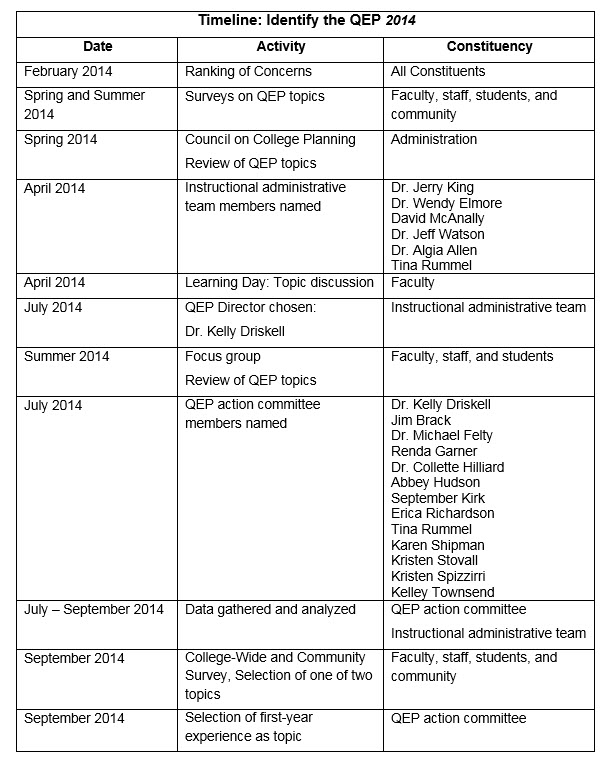
The first step is fulfilling the directive established by the Southern Association of Colleges and Schools Commission on Colleges is to identify a topic for the QEP. The topic must stem from institutional-wide assessment, so a selected group of faculty members, administrators, directors, and students explored the college’s culture, strategic plan, mission, and assessment results to begin the search for an appropriate topic. The topic had to link to the institutional mission/vision and fit into the institution’s strategic plan, as well as focus on that which institutional members felt would be of greatest benefit to our students.
Multiple surveys were conducted and there were various focus groups that addressed potential topics for the QEP throughout the spring and summer of 2014. After a QEP director was appointed, a QEP Action Committee was formed. The Action Committee was comprised of teachers, directors, administrators, and students. This committee reviewed all the data, particularly student success rates and the surveys and focus group analyses, and they determined that academic preparedness appeared to be a significant hindrance for many students, especially in that first semester of college enrollment. Solving this problem became the primary focus of the QEP, and the committee worked to determine a solution that would have a positive impact to the greatest number of students, would receive institution-wide support, and could be implemented within the college’s resource limitations.
The next few months were devoted to gathering additional data and resources to support the development of the plan. During this time, there were numerous discussions among a variety of stakeholders on the best protocol for providing the needed success-preparatory instruction. Several ideas were put forth and deliberated, but, in the end, it was decided that implementing a semester-length course with a specialized curriculum was the most efficient and comprehensive option. An established course, Learning Framework, was selected as the course that would be utilized in the plan. This course was a core course and could, therefore, be applied to every degree-seeking student’s pathway plan. It was also decided that this course would be mandated for all degree-seeking first-time-in-college (FTIC) students within their first semester of attendance at TVCC. The next step was to develop a curriculum for this course and to execute a pilot of the curriculum in order to assess its effectiveness.
Phase 2: Develop the QEP '>Phase 2: Develop the QEP
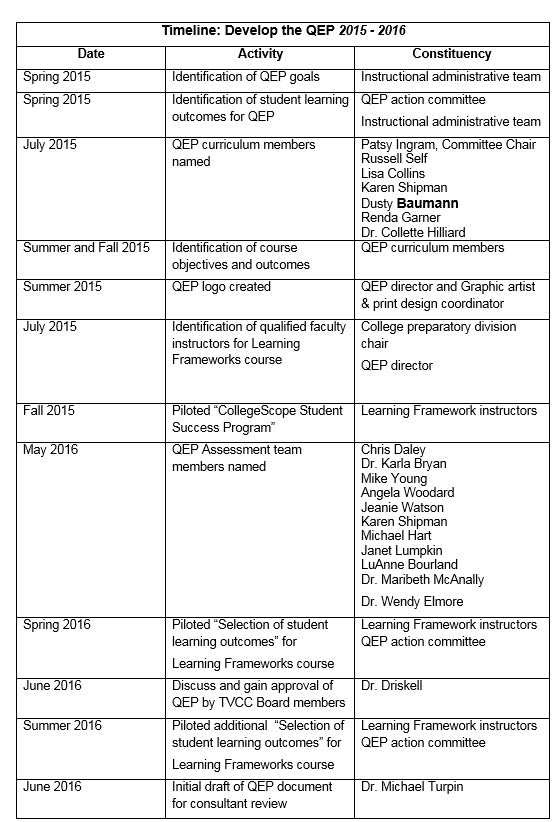
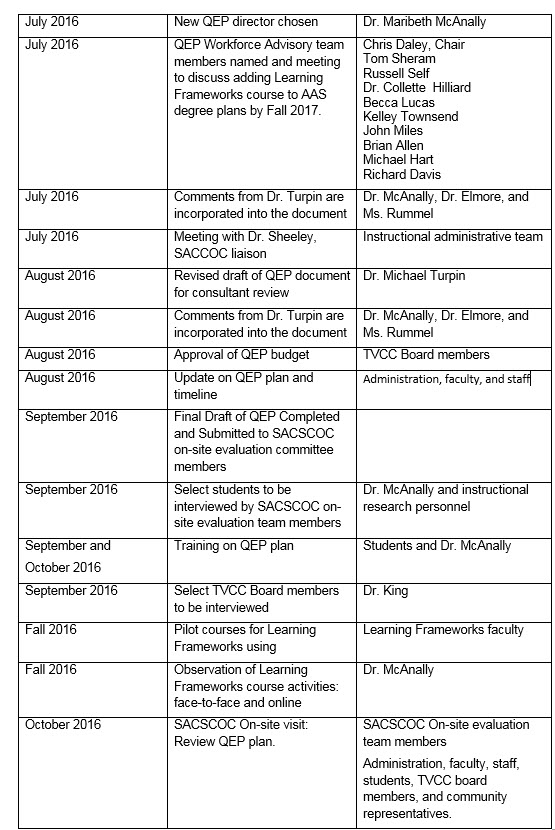
In June of 2015, a group of faculty members was selected to develop a curriculum for the Learning Framework course that would be utilized to provide the desired preparation for beginning college students. The QEP Curriculum Committee met throughout the summer and fall 2015 semester and reviewed various textbooks and curriculum plans and zeroed in on two that seemed the most attractive. The curriculum selected had to be thorough but also had to be applicable in all instructional modes, including face-to-face education, distance education, dual credit education offered via embedded faculty, and education offered at the Texas Department of Corrections.
The next step was to pilot the curriculums in order to evaluate their content, applicability to all modes of instruction, and ease of use.
During the fall 2015 and spring 2016 semesters, pilot projects were undertaken to evaluate curriculums for the Learning Framework course. One of the curriculums was tested by one faculty member on a small scale in the fall 2015 semester, and the second curriculum is being tested in the spring 2016 semester in a larger pilot. The QEP Curriculum Committee will continue to meet through the 2015-2016 school year and will determine by the end of the spring semester which curriculum it recommends to be utilized on a wider scale in the upcoming semesters.
In the meantime, soft promotion of the QEP began in the fall 2015 semester. There were articles written for publication in the TVCC News Journal online newspaper that described the QEP and discussed the implementation of the Learning Framework course. Various informative emails were disseminated college-wide, and updates on the QEP were discussed during in-service and Learning Day. Breakout sessions were offered during the fall Learning Day in order that faculty and staff were given the opportunity to ask questions and provide their perspective. During the spring Learning Day, the plenary session was dedicated to the QEP. A history of its development, the current status, and the timeline will be reviewed, and time will be allotted for question-and-answer. Members of both QEP committees will be on hand to provide information, insight, and answers to questions.
QEP'>Phase 3: Assess the QEP
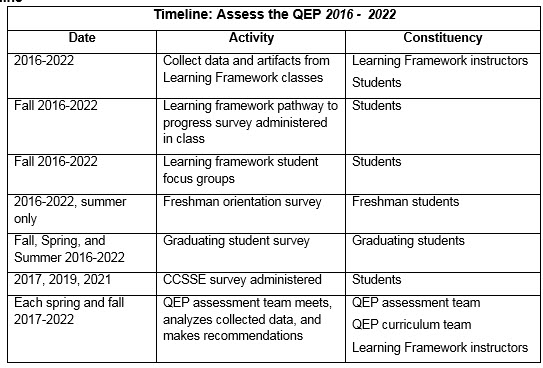
Revised Timeline for the Response Report submitted March 2017 and accepted May 2017 by SACS COC
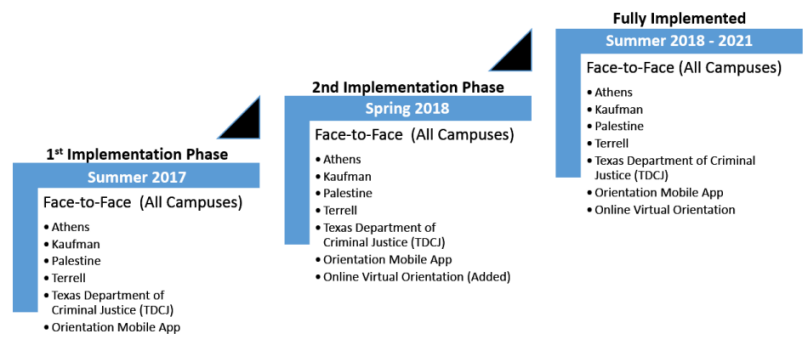
In October 2016, a visiting of SACSCOC members will come to the campus and review the documentation on the proposed QEP. They will determine if the QEP meets the guidelines and fulfills the requirements, and, if it does, they will support the implementation of our plan. They may have recommendations for improvement, and, if so, those changes will be made before full implementation of the plan gets underway.
Of course, it is our belief that our QEP will be acceptable and that we can move forward with a purposeful approach to full implementation.
Once the QEP is accepted, full implementation of the plan will take a couple of years, as resources must be allocated to cover the addition of Learning Framework course sections to fulfill the need. In time, all FTIC students on all campuses and utilizing all instructional modes will be enrolled in a Learning Framework course their first semester in college.
Assessment of the effectiveness of the QEP and evaluation of the Learning Framework course will continue each year, and changes will be made as needed. Every step in the process will be documented in a report that will be submitted to the SACSCOC five years after the implementation of the QEP.
If the implementation of the QEP plan brings about the changes desired (that is, if there is significant improvement in student success that can be deemed a result of the plan), the plan may continue to be implemented and become part of the culture of TVCC. Otherwise, the plan may be momentously altered or even phased out.